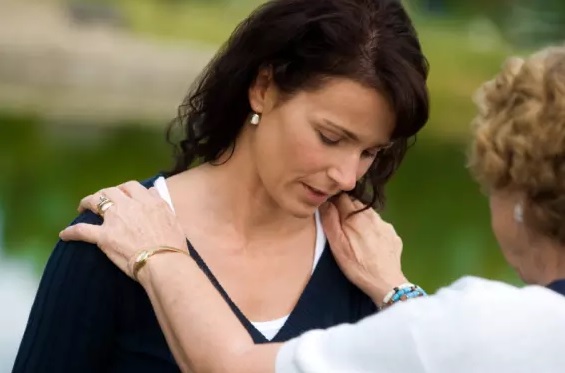Sometimes a simple gesture — a reassuring touch or kind word — can make the reality around you less painful after a traumatic event. During times when it feels like the whole world in crashing around you, the value of a warm hand or kinds words of reassurance can make all the difference.
The Trauma Intervention Program (TIP) trains volunteers who provide emotional first aid to survivors of a variety or traumatic events, such as medical emergencies, sudden death of a loved one, accidents, workplace tragedies or fire. TIP volunteer Trisha Allenwood sat with Carmen Carlton and quietly supported her while her husband was experiencing a medical emergency. Despite attempts to save his life, Carmen’s husband died, but Trisha helped her through the period of overwhelming loss.
“If it wasn’t for Trisha holding my hand and giving me strength…and I could feel it … I would not have been able to get through it,” explained Carmen. “To this day, I think of Trisha and the first time she touched my hand. I’m sure every one of them (TIP volunteers) are just like her. They’re a band of angels.”
TIP volunteers are frequently called by police officers, fire fighters, paramedics and emergency room staff to comfort people after an accident or the sudden unexpected death of a family member. Volunteers are also called by emergency personnel when an emergency patient does not have family who live nearby to comfort them.
In almost all cases, TIP volunteers arrive on the scene within twenty to thirty minutes after being requested, whether on the side of the road to help an accident victim, at someone’s home, or at the emergency department. Leslie Skillin, Program Manager for TIP, describes the volunteers in the program as “people who bring calm to the storm.” When someone is witness to another person’s death, or the survivor of an accident, he or she is in a state of shock and many times unable to make safe and sound decisions.
“Having someone just be there, and their only purpose is to emotionally support survivors in the immediate aftermath, can help people get through their grieving process in a way that they need to, so they don’t feel injured themselves,” explained Skillin. The only TIP program in Maine is in Cumberland County with 23 volunteers. Fifty plus hours of in-class training is required before each volunteer is certified and commits to three 12-hour shifts a month and attending a mandatory monthly continuing education meeting.
When volunteers are on call during their 12-hours shifts, they are expected to answer a call, any time during the day or night, to be by the side of a trauma survivor. Having a steady and dependable volunteer base ensures that someone will be on call around the clock when a crisis happens. The TIP national program recognized the Maine program recently for supporting Carmen Carlton through the tragedy of losing her husband.
Carmen is just one of the many people and families in the greater Portland area who are supported by volunteers like Trisha Allenwood, who receive calls from emergency personnel to be on the scene to offer emotional and practical support during times of unexpected pain and loss. Volunteers and emergency personnel will be honored at the 12th annual Heroes with Heart fundraiser on April 12th at the Holiday Inn by the Bay in Portland. Register for the event or make a donation to help our TIP “Band of Angels” who reside in your community.
You can learn more about TIP and other programs at Maine Behavioral Healthcare, offering mental health services to people of all ages at treatment centers throughout southern, mid-coast and western Maine.
Presented by Maine Behavioral Healthcare, a proud part of the MaineHealth family.

Send questions/comments to the editors.


